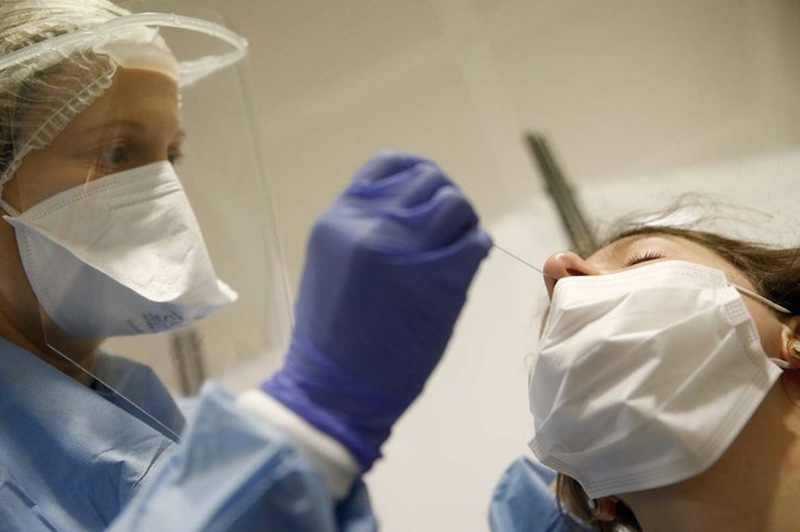latest
At Worcester Field Hospital, Baker Says Second Unit Going Up in Lowell

By Colin A. Young
Hoping to avoid the same kind of pressure that stretched the state’s health care system thin in the spring, Gov. Charlie Baker’s administration is working to get field hospitals up and running again around the state amid a second deluge of coronavirus activity that is showing no signs of receding.
After touring the field hospital that the National Guard is establishing at the DCU Center in Worcester, Baker said Thursday that the COVID-19 situation is different from the springtime surge — a smaller percentage of people who test positive require hospitalization, hospitals are moving ahead with many of the non-COVID-related procedures that were canceled in the spring and hospital beds have filled at a slower rate this fall — but that having extra hospital beds available for COVID-19 patients remains necessary.
“Field hospitals play a critical role in our preparedness strategy that helps us alleviate pressure on the health care system generally and enables hospitals to focus on non-COVID patients,” Baker said.
The Worcester field hospital is expected to begin accepting patients Sunday. Baker also announced he will have more to say soon about plans to establish a field hospital in Lowell in conjunction with Lowell General Hospital. Talks are also underway to determine if or where to open a field hospital in the southeastern part of the state, a top Baker deputy said Thursday.
Dr. Eric Dickson, president and CEO of UMass Memorial Health Care, said the reasons the state is experiencing a resurgence in coronavirus activity and again needs to establish field hospitals are right in front of everyone: the people who aren’t regularly wearing a mask or are meeting up with people from outside their household at a coffee shop or elsewhere.
“It’s because of those people that we have this field hospital going up again,” he said. “We don’t want this to be the second surge, we want this to be the final surge and it will only be the final surge if everyone follows the rules every day. This is about being a good citizen, this is about taking care of your fellow human being, and that’s what we need of you right now.”
Including all hospital patients, 73 percent of the 11,000 non-ICU beds in Massachusetts hospitals were occupied and 56 percent of the 1,800 ICU beds were full as of Tuesday, according to the Department of Public Health. The northeast part of the state appears to be under the most stress — its ICU capacity is maxed out and 82 percent of its non-ICU beds are already full.
In central Massachusetts, 75 percent of the 1,200 non-ICU beds are occupied and 67 percent of ICU beds are full, both higher than the statewide average.
On Labor Day, as Baker has pointed out previously, there were 178 COVID-19 patients hospitalized. As of Tuesday, there were 126 people with COVID-19 who required a ventilator to breathe for them or to help them breathe, and a total of 1,259 people were hospitalized in Massachusetts with confirmed cases of COVID-19.
“The most critical component of a field hospital is the staffing, it cannot be shipped from storage and put into service when we need them. And right now, this is a call for staffing,” Secretary of Health and Human Services Marylou Sudders said.
Because basically the entire country is going through a COVID-19 surge at the same time, unlike the staggered springtime surge, Sudders said many states and health care systems “all need many of the same things at the same time,” particularly skilled health care workers.
“So I’m looking straight at the cameras. If you have the skills, the ability, the can-do attitude and have time to work in a hospital, we need you. Now is the time to step up, serve your neighbors, your community, your loved ones, and the commonwealth. We urge advanced practitioners, nurses, PAs, RNs, certified nurse assistants, doctors, pharmacists, pharmacy techs, respiratory therapists, radiology technologists, social workers, registration representatives and observation assistants to apply for these positions.”
The UMass Memorial DCU Center Field Hospital was the first of five field hospitals set up during the initial springtime COVID-19 surge and was demobilized in late May. Three of the sites did not end up being used, but more than 570 patients were treated at the DCU Center and the field hospital at the Boston Convention and Exhibition Center, according to Baker’s office. Officials at the BCEC are not expecting it to be pressed into use again, and state officials have not outlined any plans yet for a field hospital in Boston.
When the Worcester field hospital was first announced on March 31, there had been a total of 6,620 COVID-19 cases in Massachusetts, 46,935 tests had been conducted, and 89 people had died from the respiratory disease. At least 562 people had been hospitalized for COVID-19.
As of DPH’s most recent data report, more than 8.5 million molecular COVID-19 tests had been administered, and a cumulative total of 225,787 people had been diagnosed with COVID-19. Deaths among confirmed COVID-19 patients total 10,588.
At full capacity, the Worcester field hospital is expected to accommodate 220 patients in a more comfortable and less isolated setting than when about 125 patients were treated at the former Centrum Centre in the spring — the second iteration will include showers, an area for COVID-19 patients to interact with each other, recumbent exercise bikes and more.
And the treatment patients will receive will also be different. Lt. Gov. Karyn Polito said the DCU field hospital this time around will have the ability to conduct on-site chest X-rays, provide oxygen and IV therapies, administer inhaler and nebulizer treatments, and will have access to on-site advanced life support.
And the doctors and nurses caring for patients have additional treatment tools in their arsenals that didn’t exist during the springtime surge, Dickson said.
“Things are different in the treatment of COVID now; we have new therapies,” he said. “Remdesivir, monoclonal antibodies, convalescent plasma — we didn’t have that when we were here in the springtime. We also have high-flow oxygen, which keeps people from getting intubated. We have built all of those capabilities into this center and we didn’t have that the first time.”






You must be logged in to post a comment Login